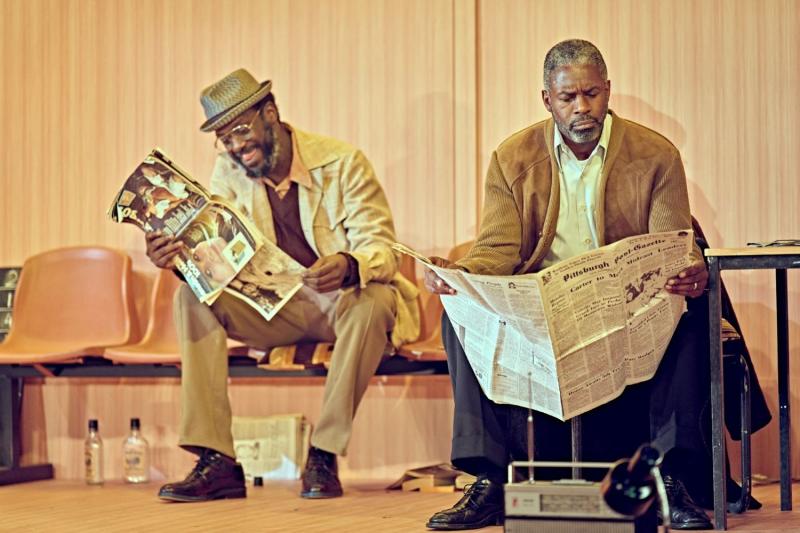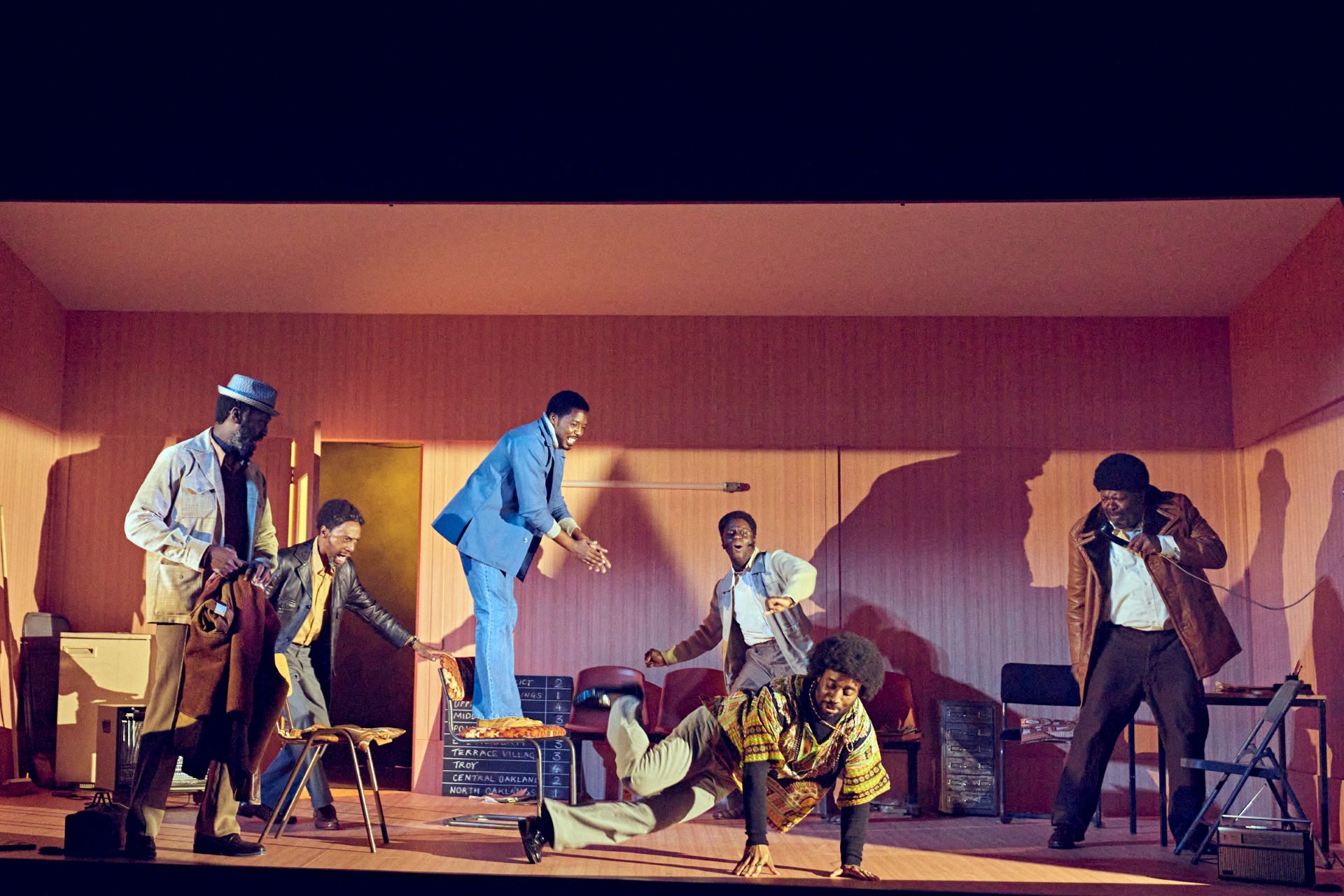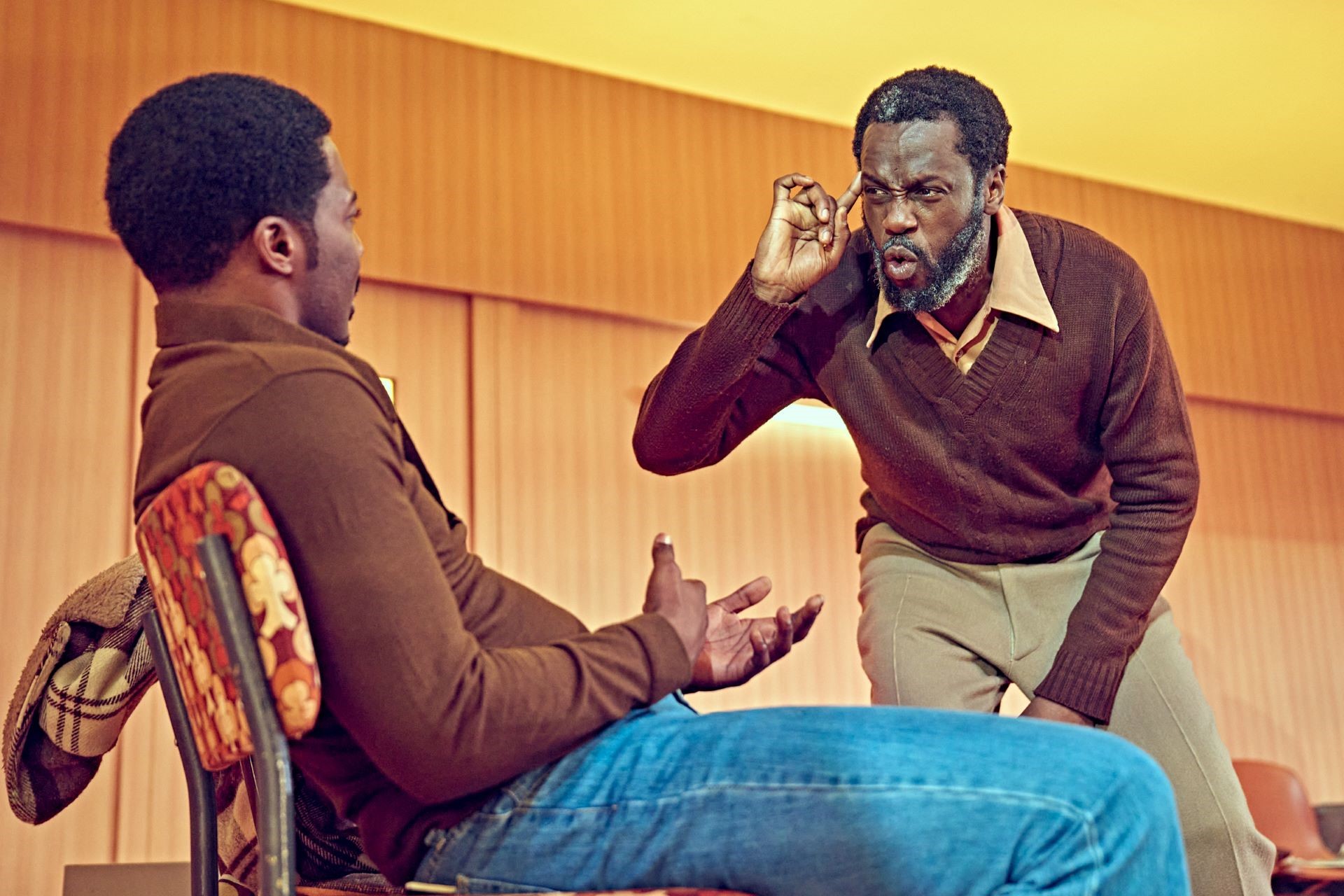Jitney, Old Vic review - a directorial delight | reviews, news & interviews
Jitney, Old Vic review - a directorial delight
Jitney, Old Vic review - a directorial delight
The first in his 'Century Cycle' catches the fabric of life that August Wilson made his own

It’s great to see August Wilson’s early play – the first of his “Century Cycle”, that remarkable decalogy that explored a century of Black American experience through the prism of the playwright’s native Pittsburgh – back on the London stage. It’s been two decades since it premiered at the National Theatre, winning the 2002 Olivier Best New Play award.
Another reason to celebrate is Tinuke Craig’s terrific production at the Old Vic (produced with Leeds Playhouse and Headlong), which gives Jitney an energy and sense of wider perspective that the play, concentrated as it is around a single interior, often appears to lack. That concentration of location is mirrored by an intensity of human interaction, and Craig draws a cracking set of performances from her cast, but it’s her work with Alex Lowde on design, Max Perryment on sound, and especially with movement director Sarita Piotrowski that really brings the atmosphere of Pittsburgh's Hill District to the fore.
Over the yellow-orange box set that’s a constant through the action, Lowde throws black and white projections over the stage that convey that we are in a city, and at a certain time (the play is set in 1977). Perryment’s score opens on a note of unease that hovers beneath the whole story: there’s a long scene of confrontation just before the interval where, when the text breaks for a moment, we realise it’s been re-enforced by the very slightest musical background throughout. And Piotrowski and Craig clearly delight in turning the between-scene interludes (pictured below) into mini-dramas in themselves, fast-played surreal mime sequences that suggest the hectic repetitions of everyday life, bringing home the energy of the environment that lies just outside the cramped gypsy cab – the “jitney” of the title – office through which Wilson’s cast passes, their arrivals and departures punctuated by the ringing ‘phone, and the “car service” refrain with which it is answered. It’s an original way of building a narrative, very much incrementally, reflecting the walk-in randomness of a workplace where the door is always open to what may appear haphazard characters. Only five of the cast of nine are drivers, working under the older, more dignified Becker (Wil Johnson); two are periodic droppers-by, while the lone woman, Rena (Leanne Henlon), has two scenes involving her partner Youngbood (played with winning charm by Solomon Israel), who’s the youngest and most voluble of the drivers, not long demobbed from Vietnam. (Pictured below, Solomon Israel and Sule Rimi)
It’s an original way of building a narrative, very much incrementally, reflecting the walk-in randomness of a workplace where the door is always open to what may appear haphazard characters. Only five of the cast of nine are drivers, working under the older, more dignified Becker (Wil Johnson); two are periodic droppers-by, while the lone woman, Rena (Leanne Henlon), has two scenes involving her partner Youngbood (played with winning charm by Solomon Israel), who’s the youngest and most voluble of the drivers, not long demobbed from Vietnam. (Pictured below, Solomon Israel and Sule Rimi)
It takes a while for each of the main identities to become established, but Wilson builds them with accomplishment, the standout here being Sule Rimi’s Turnbo, whose tendency to interfere, to provoke has him flying off the handle at any moment. Geoff Aymer’s keep-to-himself Doub holds back from the attention, while Tony Marshall’s Fielding is defined by his predilection for drink and the arguments that follow, though he’s engaging in his cups.
But Wilson moves from this casual, slice-of-life drama-comedy – the laughter is plentiful – with its lovely banter-infused dialogue towards a different register, one that is somehow more consciously serious. There are more contemplative tones throughout, of course, as when Doub, a veteran of the Korean war, ponders the realities facing the more recently discharged Youngblood. But it’s in the parallel strand that emerges with the appearance of Becker’s estranged son Booster (played on press night by understudy Blair Gyabaah with a real command of the character’s conflicting range of emotions) that we notice the change of direction.
 Booster has been released from 20 years behind bars for shooting the white girlfriend who had invented a rape allegation against him, and the interchange between father and son becomes Jitney’s emotional high point. The anger across the generations reveals a whirl of feelings – so much so that it's uncertain how convincingly it melds with what has come before. There’s also a second-half motif, revolving around the neighbourhood being redeveloped, thus threatening eviction for this happy-go-lucky work crowd, that feels like a “theme” being imposed rather than something that evolves organically. It’s barely raised before it seems to be resolved and then forgotten, while Wilson’s ending feels more than a bit pat, too.
Booster has been released from 20 years behind bars for shooting the white girlfriend who had invented a rape allegation against him, and the interchange between father and son becomes Jitney’s emotional high point. The anger across the generations reveals a whirl of feelings – so much so that it's uncertain how convincingly it melds with what has come before. There’s also a second-half motif, revolving around the neighbourhood being redeveloped, thus threatening eviction for this happy-go-lucky work crowd, that feels like a “theme” being imposed rather than something that evolves organically. It’s barely raised before it seems to be resolved and then forgotten, while Wilson’s ending feels more than a bit pat, too.
Written in 1979, Jitney is the only one of Wilson’s “Century Cycle” – each work is dedicated to a decade of the 20th century – to be set in the years in which it was written. But it was only after Wilson revised the piece considerably in the mid-1990s that it received a professional staging, with the Broadway premiere arriving much later, in 2017. There's a sense of it being an early work that is there in Wilson’s use of monologues (though he relished them throughout his work): some fulfil the role of story elucidation to such an extent that they almost count as anti-drama. The absence of the far fuller female roles, as well a sense of the physical scale of the world outside Jitney’s claustrophobic interior, that he achieved in later plays can also be felt. That makes Craig’s extra staging touches all the more welcome – and the germ of the world, the sheer fabric of life that Wilson would go on to make his own is here already, unforgettably.
rating
Share this article
The future of Arts Journalism
You can stop theartsdesk.com closing!
We urgently need financing to survive. Our fundraising drive has thus far raised £49,000 but we need to reach £100,000 or we will be forced to close. Please contribute here: https://gofund.me/c3f6033d
And if you can forward this information to anyone who might assist, we’d be grateful.

Subscribe to theartsdesk.com
Thank you for continuing to read our work on theartsdesk.com. For unlimited access to every article in its entirety, including our archive of more than 15,000 pieces, we're asking for £5 per month or £40 per year. We feel it's a very good deal, and hope you do too.
To take a subscription now simply click here.
And if you're looking for that extra gift for a friend or family member, why not treat them to a theartsdesk.com gift subscription?
more Theatre
 Ragdoll, Jermyn Street Theatre review - compelling and emotionally truthful
Katherine Moar returns with a Patty Hearst-inspired follow up to her debut hit 'Farm Hall'
Ragdoll, Jermyn Street Theatre review - compelling and emotionally truthful
Katherine Moar returns with a Patty Hearst-inspired follow up to her debut hit 'Farm Hall'
 Troilus and Cressida, Globe Theatre review - a 'problem play' with added problems
Raucous and carnivalesque, but also ugly and incomprehensible
Troilus and Cressida, Globe Theatre review - a 'problem play' with added problems
Raucous and carnivalesque, but also ugly and incomprehensible
 Clarkston, Trafalgar Theatre review - two lads on a road to nowhere
Netflix star, Joe Locke, is the selling point of a production that needs one
Clarkston, Trafalgar Theatre review - two lads on a road to nowhere
Netflix star, Joe Locke, is the selling point of a production that needs one
 Ghost Stories, Peacock Theatre review - spirited staging but short on scares
Impressive spectacle saves an ageing show in an unsuitable venue
Ghost Stories, Peacock Theatre review - spirited staging but short on scares
Impressive spectacle saves an ageing show in an unsuitable venue
 Hamlet, National Theatre review - turning tragedy to comedy is no joke
Hiran Abeyeskera’s childlike prince falls flat in a mixed production
Hamlet, National Theatre review - turning tragedy to comedy is no joke
Hiran Abeyeskera’s childlike prince falls flat in a mixed production
 Rohtko, Barbican review - postmodern meditation on fake and authentic art is less than the sum of its parts
Łukasz Twarkowski's production dazzles without illuminating
Rohtko, Barbican review - postmodern meditation on fake and authentic art is less than the sum of its parts
Łukasz Twarkowski's production dazzles without illuminating
 Lee, Park Theatre review - Lee Krasner looks back on her life as an artist
Informative and interesting, the play's format limits its potential
Lee, Park Theatre review - Lee Krasner looks back on her life as an artist
Informative and interesting, the play's format limits its potential
 Measure for Measure, RSC, Stratford review - 'problem play' has no problem with relevance
Shakespeare, in this adaptation, is at his most perceptive
Measure for Measure, RSC, Stratford review - 'problem play' has no problem with relevance
Shakespeare, in this adaptation, is at his most perceptive
 The Importance of Being Earnest, Noël Coward Theatre review - dazzling and delightful queer fest
West End transfer of National Theatre hit stars Stephen Fry and Olly Alexander
The Importance of Being Earnest, Noël Coward Theatre review - dazzling and delightful queer fest
West End transfer of National Theatre hit stars Stephen Fry and Olly Alexander
 Get Down Tonight, Charing Cross Theatre review - glitz and hits from the 70s
If you love the songs of KC and the Sunshine Band, Please Do Go!
Get Down Tonight, Charing Cross Theatre review - glitz and hits from the 70s
If you love the songs of KC and the Sunshine Band, Please Do Go!
 Punch, Apollo Theatre review - powerful play about the strength of redemption
James Graham's play transfixes the audience at every stage
Punch, Apollo Theatre review - powerful play about the strength of redemption
James Graham's play transfixes the audience at every stage
 The Billionaire Inside Your Head, Hampstead Theatre review - a map of a man with OCD
Will Lord's promising debut burdens a fine cast with too much dialogue
The Billionaire Inside Your Head, Hampstead Theatre review - a map of a man with OCD
Will Lord's promising debut burdens a fine cast with too much dialogue

Add comment